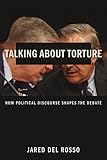Talking About Torture : How Political Discourse Shapes the Debate / Jared Del Rosso.
Material type: TextPublisher: New York, NY : Columbia University Press, [2015]Copyright date: ©2015Description: 1 online resource (296 p.)Content type:
TextPublisher: New York, NY : Columbia University Press, [2015]Copyright date: ©2015Description: 1 online resource (296 p.)Content type: - 9780231170925
- 9780231539494
- Extraordinary rendition -- Government policy -- United States
- Torture -- Government policy -- United States
- Torture -- Political aspects
- War on Terrorism, 2001-2009
- Einstellung
- Folter
- Terrorismus
- Vernehmung
- Politische Einstellung
- Bekämpfung
- Parlamentsdebatte
- Menschenrechtsverletzung
- Akteur
- LAW / International
- 364.670973 23
- HV8599.U6 D45 2015
- online - DeGruyter
- Issued also in print.
| Item type | Current library | Call number | URL | Status | Notes | Barcode | |
|---|---|---|---|---|---|---|---|
 eBook
eBook
|
Biblioteca "Angelicum" Pont. Univ. S.Tommaso d'Aquino Nuvola online | online - DeGruyter (Browse shelf(Opens below)) | Online access | Not for loan (Accesso limitato) | Accesso per gli utenti autorizzati / Access for authorized users | (dgr)9780231539494 |
Frontmatter -- Contents -- Preface -- A note on the senate intelligence committee's report on the CIA's detention and interrogation program -- Introduction -- Chapter One. The Torture Word -- Chapter Two. The Heartbreak of Acknowledgment: From Metropolitan Detention Center to Abu Ghraib -- Chapter Three. Isolating Incidents -- Chapter Four. Sadism on the Night Shift: Accounting for Abu Ghraib -- Chapter Five. "Honor Bound": The Political Legacy of Guantánamo -- Chapter Six. The Toxicity of Torture: Waterboarding and the Debate About "Enhanced Interrogation" -- Chapter Seven. From "Enhanced Interrogation" to Drones: U.S. Counterterrorism and the Legacy of Torture -- Appendix: constructionism and the reality o f torture -- Notes -- Bibliography -- Index
restricted access online access with authorization star
http://purl.org/coar/access_right/c_16ec
When the photographs depicting torture at Iraq's Abu Ghraib prison were released in 2004, U.S. politicians attributed the incident to a few bad apples in the American military, exonerated high-ranking members of the George W. Bush administration, promoted Guantánamo as a model prison, and dismissed the illegality of the CIA's use of "enhanced interrogation." By the end of the Bush administration, members of both major congressional parties had come to denounce enhanced interrogation as torture and argue for the closing of Guantánamo. What initiated this shift? In Talking About Torture, Jared Del Rosso reviews transcripts from congressional hearings and scholarship on denial, torture, and state violence to document this wholesale change in rhetoric and attitude toward the use of torture by the CIA and the U.S. military during the War on Terror. He plots the evolution of the "torture issue" in U.S. politics and its manipulation by politicians to serve various ends. Most important, Talking About Torture integrates into the debate about torture the testimony of those who suffered under American interrogation practices and demonstrates how the conversation continues to influence current counterterrorism policies, such as the reliance on drones.
Issued also in print.
Mode of access: Internet via World Wide Web.
In English.
Description based on online resource; title from PDF title page (publisher's Web site, viewed 02. Mrz 2022)


